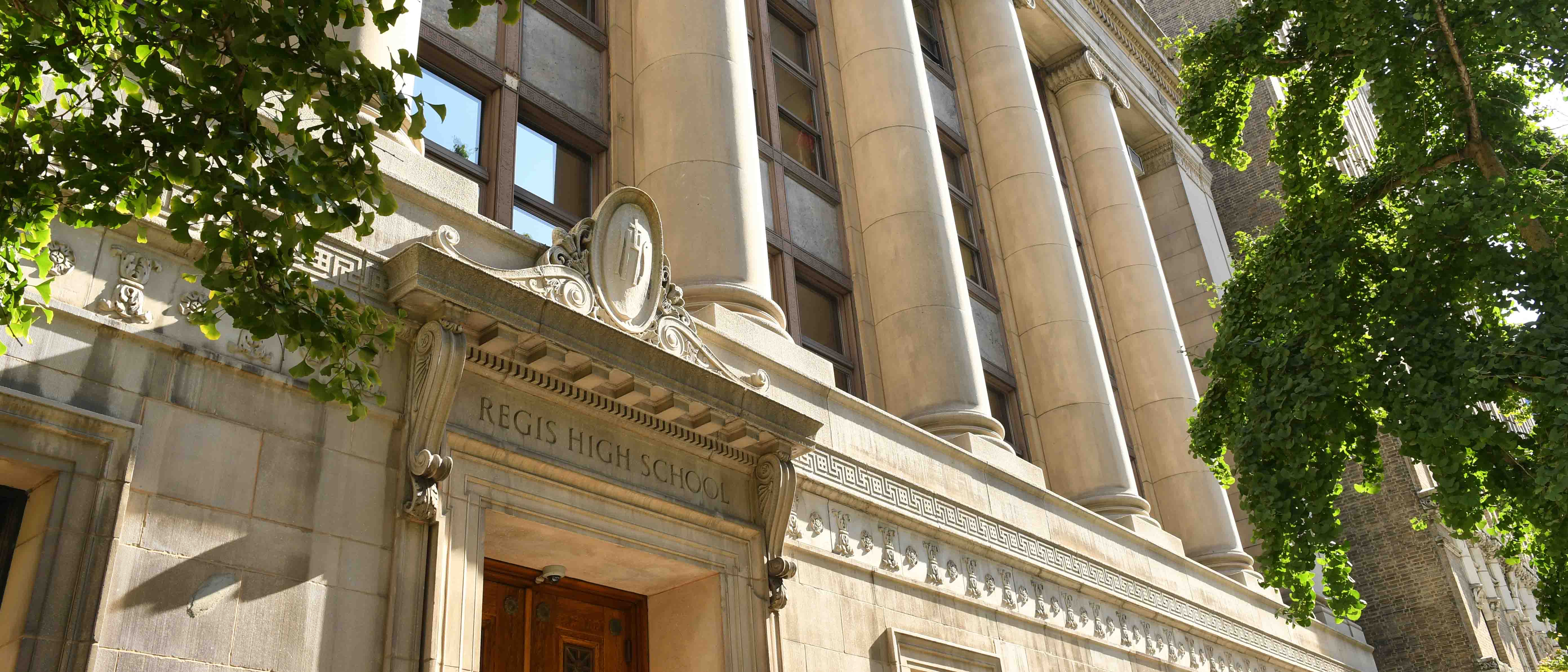Caring For Our Common Home
As Preston Ferraiuolo ’22 and Jake Lang ’21 prepared to meet with Fr. Daniel K. Lahart, SJ, this summer, they were both hopeful and anxious. They felt passionately about their proposal but nervous about making a formal request to the school president.
Speaking with Fr. Lahart over Zoom, Ferraiuolo and Lang gave their pitch as to why Regis, as a Catholic institution, must be called to a deeper service to the world around us. Within an hour of their conversation, Fr. Lahart had officially signed on to the U.S. Catholic Climate Declaration, a petition for Catholic institutions across the country to act on climate change for the sake of our one, human family.
“It was an easy decision,” Fr. Lahart said. “Jake and Preston not only possessed an impressive and persuasive command of environmental issues, they demonstrated how deeply they cared about Regis doing its part to serve the greater good in this way. At a school where we seek to form Men for Others, the meeting was a wonderful manifestation of that aim.”
The choice to sign the declaration is part of a growing emphasis at Regis and among Regians to protect the environment. At 84th Street, Regis’ green roof, spearheaded by former president Fr. Philip G. Judge, SJ, ’80, provides increased solar energy to the building. Faculty and staff have been encouraged to collect assignments virtually and discard any paper products in designated paper recycling bins, significantly reducing contributions to paper waste in landfills.
These initiatives reflect a growing call from the Catholic Church to safeguard God’s creation. Last year, the Society of Jesus released its Universal Apostolic Preferences, a set of four areas of focus that should animate and drive the work of Jesuits over the next decade. One of these preferences — “To collaborate in the care of our Common Home” — directs Jesuit institutions to make the environment a priority. It echoes the call that Pope Francis made in 2015 in his second encyclical, "Laudato Si."
This summer, a group of Regis students delved deeply into the issue during J-Term, a series of optional five-day intensive courses offered by Regis teachers — this year remotely — over the summer. Caring for the Common Home, a class co-taught by Ms. Karin Miller-Lewis and Mr. Anthony DeBonis, was designed to explore the environmental crisis that we face and learn about what is at stake if concerted action is not taken. “We won’t be able to solve our environmental problems without bringing Ethics, the Humanities, and Science together to reignite a love of nature,” said Ms. Miller-Lewis, who conceptualized the course after attending an environmental seminar at Carroll College. In class, students analyzed the major issues at play both locally and globally, learning from area experts about potential solutions people and institutions like Regis can work towards to effect meaningful change. “I think with the spread of information and the interconnectivity that our age affords, it’s difficult to ignore the environmental and human costs of what Pope Francis calls the ‘throwaway culture,’” Mr. Debonis said. “It’s one thing to acknowledge climate change, and another entirely to be converted by that knowledge.”
The class included a virtual visit to Freshkills, the largest park to be developed in New York City in over 100 years. Formerly the site of the Fresh Kills Landfill, the 2,200 acre plot of land on Staten Island was part of an ecological project with the City of New York, promoting environmental research and sponsoring educational and recreational programs for the public. Students also had the chance to meet one of the mobilization directors of Sunrise Movement, a youth-led social movement to stop climate change and elect leaders who will introduce responsible environmental policies for the well-being of current and future generations.
As part of an assignment to encourage the Regians to take action, pairs of students were asked to interview leaders in the Regis community to discuss plans that could be set in motion to make caring for the environment an integral part of Regis life. Ferraiuolo and Lang were tasked with interviewing Fr. Lahart, and in thinking about their approach and the ideas they wanted to convey in the meeting, the students remembered an earlier conversation they had had in class about the U.S. Catholic Climate Declaration, which Mr. DeBonis had become aware of when he took a group of students to Washington, DC for the 2019 Ignatian Family Teach-In.
“Having Regis sign on to that climate declaration is just one small piece to this work,” Lang said. “It’s a commitment, and it’s a foundation from which we can always build upon.”
The work continues during this academic year. Ms. Maura Toomb-Estevez, a member of the Theology Department, offered a senior elective this year called Environmental Theology. Ms. Toomb-Estevez said she hopes students leave her class able to reflect on the environmental news and science they are exposed to and respond in the way the Catholic tradition calls them to. Ferraiuolo, who also serves as president of the club Regis ECO, represented Regis on the planning committee for The Students for Environmental Justice Conference, an initiative held in November that equipped New York City students in grades 7-12 to advocate for environmental change in their communities.
“The environment is not going to go away, and the same thing can be said about injustice,” Ferraiuolo said. “The Regis community remains uniquely strong and dedicated to standing in defense of our Earth, the common home we all share and love.”
Read more Regis news
